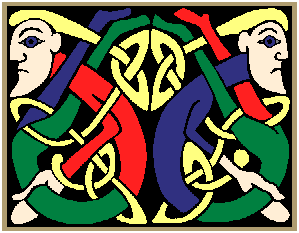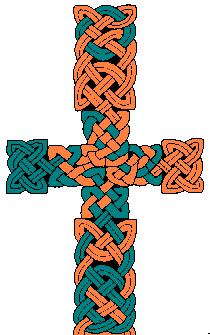|
|
|
 |
Celtic |
 |
| Main Celtic Deities: (An introductory list) | |||||
| Celts: | |||||
| Dagda | Math | Magog | Dwyn | Ogma | Belinus |
| Esos | Teutates | Taranis | Mabon | Borvo | Epona |
| Beli | Govannon | Diancecht | Lludd | Gwydion | Amaethon |
| Lleu | Dylan | Ler | Llyr | Bran | Manannan |
| Dana | Morrigan | Brigit | Blathnat | Arianrod | Blodeuwedd |
| Creirwy | Keridwen | ||||
| Wales: | |||||
| Gwydion | Aranrhod | Dylan | Bendigeidfran | Branwen | Manawydan |
| Pwyll | Pryderi | Caridwen | Bran | Penarddun | Branwen |
| Manawydan | Nisien | Efnisien | Belatucadros | Dewi | Govannon |
| Gwynn ap Nudd | Lleu | Llyr | Math ap Mathonwy | Modron | Rhiannon |
| Ireland: | |||||
| Balor | Bres | Elatha | Eriu | Bile | Boann |
| Nechhtan | Oengus | Banbha | Fodla | Brigit | Cliodna |
| Creidhne | Goibhniu | Luchta | In Dagda | Danu | Donn |
| Dian Cecht | Lir | Lug | Morrigan | Macha | Nemhain |
| Nuada | Ogma | Cathbadh | Conall Cernach | Conchobar | Cu Chulainn |
| Cu Roi | Deirdre | Naoise | Fedelma | Ferghus | Finn |
| Grainne | Mac Da Tho | Medb | Oisin | Partholon | |
| Britain: | |||||
| Belatucadrus | Cocidius | Condatis | Tyne | Coventina | Cuda |
| Mogons | Nodens | Sulis | Vitiris | ||
| Gaul: | |||||
| Rosmerta | Nantosuelta | Sucellus | Abnoba | Andraste | Belenus |
| Borvo | Cernunnos | Damona | Epona | Esus | Nehalennia |
| Ogmios | Sirona | Taranis | Teutates | Lugus | |
| The Irish sagas: | |
| The Mythological Cycle: Deals with the pagan Celtic gods/supernatural beings. | |
| The Ulster Cycle: Deals with the exploits of the warrior caste of pre-Christian Ireland. | |
| The Historical Cycle: Deals with the activities of "historical" figures. | |
| The Fenian Cycle: Deals with the tales of Finn Mac Cumaill and his band of followers, the Fianna. | |